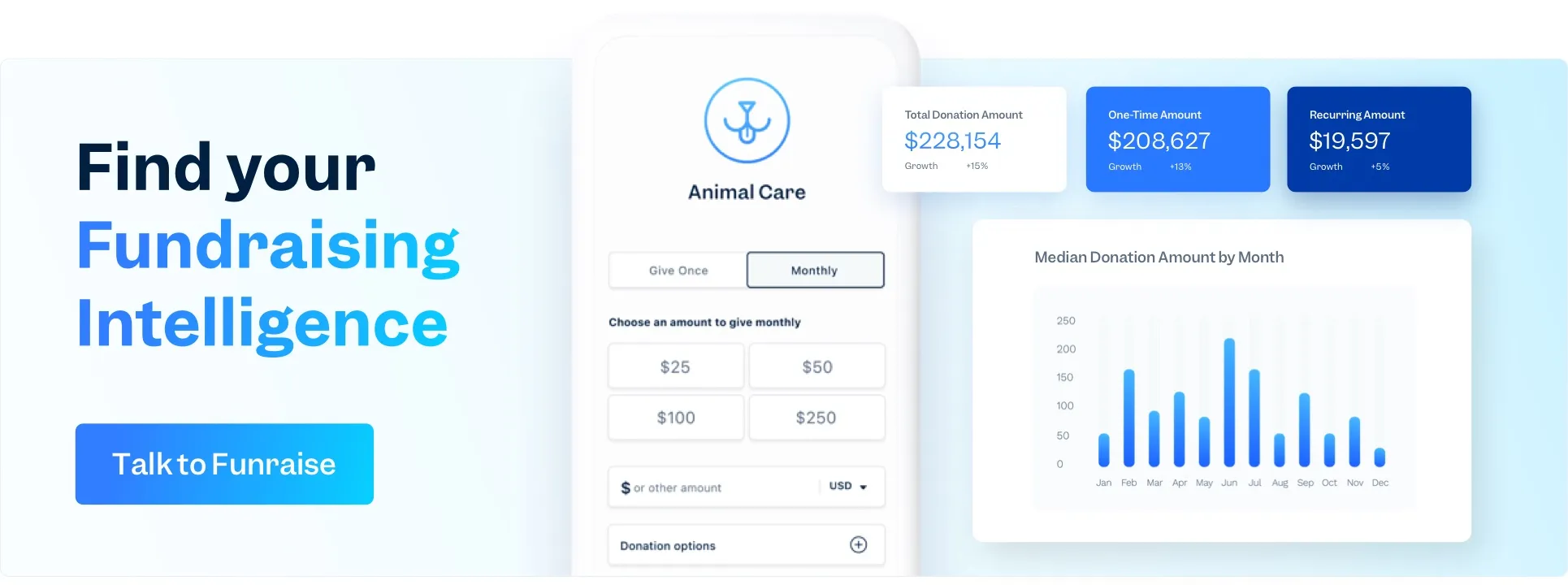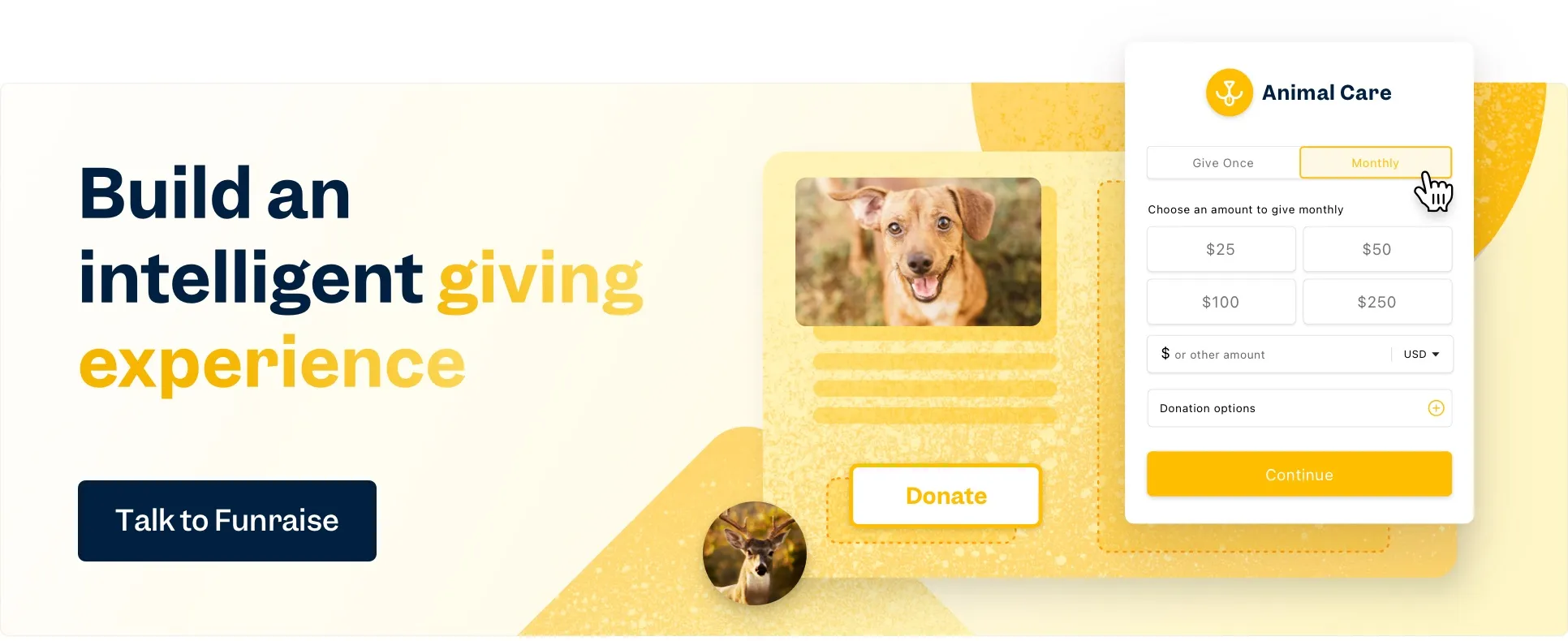When it comes to fundraising, donors are nonprofits' bread, butter, and large-flake sea salt. We love major donors and smaller donors, donors of all shapes and sizes, but among the wide range of individual donors, we're here to shine a light on corporate donors with their large networks and promises of stability.
What is the difference between corporate donor and sponsor?
A corporate donor gives to a nonprofit based on a sense of social responsibility without expecting any direct benefits in return. In a corporate sponsorship, however, there's a mutually beneficial relationship between the two parties, and the corporation gives its support in exchange for specific benefits. As such, instructions on how to pitch for corporate sponsorship and how to ask for corporate donations are quite different.
Types of corporate donations
Now, back to our regularly-scheduled corporate donors for nonprofits! When a corporation decides to donate to a nonprofit, they don't just whip out a credit card and charge a charitable donation to the company account (we wish!). Instead, there are many types of corporate donations. Here's a brief rundown, along with some real-life examples.
Corporate donation matching
Many companies participate in a matching gift program, matching employee donations to eligible organizations. This is pretty magical because it effectively doubles the impact of individual donations (plus it leads to higher average donations). For instance, Bank of America matches all employee contributions up to $5,000 every year. Corporate matching is great for nonprofits because it requires minimal legwork; in fact, nonprofits that use Funraise can add a company search field to their donation forms to let donors check if they're eligible with a few keystrokes. Time to get that end-of-year matching gift campaign up and running!
Grants
Some corporations provide charitable grants to nonprofits, donating to support specific projects or initiatives. Since companies are accountable to their stakeholders, grant programs give them more control over how funds are used than cash donations. There are many types of corporate grants, with many larger corporations funding local nonprofits through community grants. If you pop on over to the Coca-Cola Foundation's webpage, you'll see that they provide cash grants to a variety of nonprofits that align with their areas of focus.
Products
Some companies make product donations to nonprofits in lieu of a financial contribution. For instance, a tech company might donate laptops to a nonprofit serving underprivileged students, or a pet store might donate dog food to an animal shelter. In fact, the Coca-Cola Foundation's donation portal allows nonprofits to apply for both financial grants and "beverage products." Can't we have both?!
Services (hours)
For a more hands-on approach to corporate giving programs, there's always the option to give the gift of time over financial donations. Some corporations prefer to donate hours and expertise, allowing their employees to volunteer during working hours or providing valuable professional services free of charge. For instance, American Airlines' Do Crew volunteer program connects employees with volunteer opportunities in their communities; last year, members spent 157,000 hours volunteering.
Pledges
Corporations are intentional about how they make and spend that hard-earned for-profit cash, and pledges help them plan for the future. A company can make a long-term investment in a nonprofit by agreeing to give a specific amount of money over a period of time. So, if a corporation pledges to give $500,000 to a cause over five years, they'll give $100,000 a year until they reach their goal. Let's hear it for stability!
Best practices to get a corporate donor
So, you've heard all about these generous companies, and now you want a corporate donor for yourself? Of course you do. Here are some helpful tips as you begin your journey.
Offer a one-sheeter of needs and impact
If you want corporate contributions, companies need to know a) what you need and b) what you do. An easy way to sum up your organization's needs and impact is with a simple one-sheeter that shares key areas of focus and statistics. What type of support would be most helpful? What does it allow you to accomplish? Make it accessible, punchy, and succinct. You can pull a lot of this information from your annual report.
Be relevant to their goals
Many larger corporations have a page on their website detailing what types of organizations they support. Before any donation or grant requests, make sure you align with their organizational and corporate social responsibility goals. For example, Alaska Airlines looks for nonprofit partners focusing on career connections for young people, diversity and inclusion, environmental sustainability, and socioeconomic mobility. United Airlines, on the other hand, focuses on disaster relief, DEI, education, and environmental sustainability. Environmental organizations, take note: airlines are making up for their carbon footprint!
Think long-term and short term
Would you rather have $1,000 now or $400 a year for the next five years? When it comes to charitable contributions of any size with any donor segment, you want to balance your immediate needs with your long-term vision. With every corporate donation request, have a plan for how that one-time gift can evolve over time. By turning corporate donors into corporate partners, you can forge lifelong relationships, driving visibility and stability in the years ahead.
Have a consistent social media voice
Most companies have a designated social media guru, so make sure they're seeing that your charitable organization has a consistent and compelling online presence. Share success stories, current needs, and corporate partners' positive impact. You never know who's reading (or scrolling)!
Engage your network
Your board and volunteers are your ticket to major donors and major impact. They can help with everything from grant requests to event sponsorship, so let them lend a hand with corporate donations, too. Maybe they used to work at a particularly philanthropic company, or perhaps their third cousin twice removed is the VP at American Eagle. The point is, you never know who you know until you know. You know?
Embrace technology
Generally speaking, technology makes things easier, so lean on your fundraising technology solutions to streamline and support the acquisition process. Track everything in your CRM, from individual donor interactions to sponsorship requests. Embrace AI to write targeted appeals. Nurture every relationship with automated emails and personalized asks. You never know which connection will lead to your next corporate donor!
Stay on top of corporate trends
Just like nonprofit trends change by the day, so do corporate trends. By staying on top of all the latest corporate philanthropy news and the ever-changing social responsibility landscape, you can tailor your strategy to your donors. So, sign up for some newsletters and get those talking points straight.
How do you thank a corporate donor?
When you have an individual donor to thank, you can write a letter, send an email, or even pick up the phone (gasp!). But when it's a whole company, saying thank you becomes a bit more complicated. Here are a few things to keep in mind when it comes to thank-you notes for donations.
- Thank the point person. Address any direct mail or email to whoever was your point person/point team. Thank them for being your amazing liaison and making all of this possible. Then, share your appreciation for the whole company.
- Highlight the impact. Corporations like to be appreciated, but they mostly care about social impact. Emphasize what you've accomplished thanks to their charitable donation, and don't forget to be specific.
- Say thank you publicly. This isn't a corporate sponsorship, but it's still nice to thank your corporate donors in public. Whether it's a social media post or a blurb in your newsletter, share the news that they're supporting your charitable organization. They'll love the free press, and you just might inspire other companies to give, too.
- Give them full credit. When you express appreciation to a company, make it about them, not you. Use phrases like "Thanks to you" and "With your support" when you share success stories.
- That signature matters. Corporate donations can lead to long-term partnerships and major gifts, and that deserves your ED's signature and maybe a short personalized note. We know they're busy, but they can sign letters while rewatching Mad Men!
What are some popular companies that donate to nonprofit organizations?
Pretty much all global companies donate to eligible nonprofits in some form or other, whether it's community grants, product donations, gift cards, or matching gift revenue. While there's considerable debate about who's the most generous of them all, plenty of big companies give back in a big way. That includes:
- Tech companies, like Google (we see you, Google Ad Grant!), Salesforce, Microsoft, and Amazon.
- Household names, like the Coca-Cola Company, Nike, and Starbucks.
- Financial institutions, such as Bank of America and Wells Fargo.
- Major airlines, like Alaska Airlines, United Airlines, American Airlines, and Southwest Airlines.
- And in a feel-good twist, many companies are integrating corporate philanthropy efforts into their DNA, like Warby Parker, Patagonia, and Tom's.

In addition to the companies above, some corporations have their own foundations that work with nonprofit partners to give back. Much like private foundations, you can easily research major companies' previous grants to organizations to see if you're a good fit. Common areas of focus for corporate foundation grants to nonprofits include human rights, education, sustainability, economic empowerment, social services, and community development. Popular charitable foundations connected to corporations include the Coca-Cola Foundation, Johnson & Johnson Foundation, and Target Foundation.
Finally, a lot of companies have corporate philanthropy programs that include strong volunteer grant programs. Corporations like CVS Health, Disney, and Verizon incentivize their employees to get involved and give back with hours or dollars. With many of these, they'll match employee donations or donate a certain amount of money for every X hours an employee volunteers. Note that political donations and religious ones can be a bit more complicated.
And a quick heads up: If your nonprofit is looking for corporate foundation funding, you can search for grant programs on Foundation Directory, which shares information of foundations providing grants to nonprofits. Red Cross and Feeding America use it, so ... yep!
What are the ethical implications of corporate donors?
Of course, accepting money from a corporate donor isn't all sunshine and big checks. Corporate America is complex, and as an organization fighting the good fight, you do want to consider ethics before pursuing or accepting a donation. A few areas to pay particular attention to:
Values match
First, ask yourself: Does the company align with your organization's values? If you're an environmental organization, chances are that check from Monsanto is going to leave a sour aftertaste. It's a complicated calculation, so only you can decide what you feel comfortable with.
Tax implications for the corporate donor
Is your corporate partner in it for the do-gooding or for the tax break? Some corporate philanthropy programs are all about offsetting taxable income rather than supporting the cause at hand. Generally, this is fine as long as it's all good and legal ... so be sure to dot your i's and cross your t's!
Long-term partnership
A big monetary donation is pretty irresistible, but the ethical implications of said gift should extend beyond the immediate financial benefit. You're about making long-term change, so consider whether the partnership will support your organization's long-term financial health. For instance, disaster response organizations might find themselves with major funds while the headlines are front and center but dwindling support for continued humanitarian relief efforts in the months and years ahead. Don't be afraid to discuss these concerns with potential corporate donors.
Limitations on corporate donations
Some corporate contributions come with limitations or specific conditions, and you'll want to ensure they mesh with your org before saying yes to the gifts. For example, some companies specify that you can only use the funds for certain nonprofit programs or priorities.
What is NOT a corporate donation
A corporate donation by any other name is decidedly NOT as sweet. Keep an eye out for the items below, which are not corporate donations.
Board representation
If a major company representative wants to join your board, bringing their experience and connections and employee donations and matching gift funds with them, that's usually great news! What it's not, however, is a corporate donation. Board representation is a form of partnership, requiring careful collaboration and shared governance. Donations are cash (or cash-value) contributions—end of story.
Products you can't use
Product donations that are useful? Fabulous! If Lowe's donates gift cards to an economic development nonprofit so they can build houses for those in need, that makes perfect sense. But if Gucci donates a case of stilettos to a human services organization ... that's not doing anything for anyone (unless you have an online auction coming up and a lot of Sex and the City fans attending).
Team building projects
When corporate employees take a business day to get together and give back through volunteer work, it's a lovely thing. But employee volunteer projects are a form of team building and corporate social responsibility—not donations. Consider requesting monetary grants alongside any team-building activities to ensure you're getting as well as you're giving—here are all the community service fundraising ideas you need.
Exposure
When a business gives your nonprofit a shout-out as part of its corporate philanthropy program, that's wonderful! Word of mouth is swell and can lead to increased gifts (and increased matching gift revenue). But just giving your organization 15 minutes in the spotlight does not a donation make.
Big business means big budgets and big resources, making corporate donations a prime opportunity for eligible organizations to up their donations—and their oomph. Time to start spreading the wealth!
Corporate donor key takeaways
How do you respond to a corporate gift?
On the whole, respond to a corporate gift as you would an individual one. Show genuine gratitude, personalize your outreach, and detail the impact of their contribution. Then, strengthen the relationship through regular updates and consider involving them with your organization in ways besides donation requests.
What are the easiest companies to get donations from?
Alas and alack, there is no single company that's a sure-fire corporate donor. But you can up your odds of success by doing your research, including understanding the company's values, priorities, and grant programs, and then evaluating how your organization aligns with them. Focus on companies that are clearly committed to corporate social responsibility with a history of supporting similar causes.
How does the corporation benefit from donating?
There are a number of benefits for corporations that give to nonprofit organizations, including an improved reputation, greater employee engagement, networking opportunities, and potential tax benefits. And, of course, they get to have a positive impact on society. Who doesn't want that?
How do you get a crisis response donation from a company?
Companies often donate to disaster relief when an issue is in the news, so get your organization's name out there. Then, develop a one-page statement with key facts and needs and appeal directly to potential corporate donors with a history of disaster and humanitarian relief. Make sure they know it's urgent and time-sensitive.































.webp)
.webp)











.webp)
.webp)

.webp)
.webp)
.webp)




